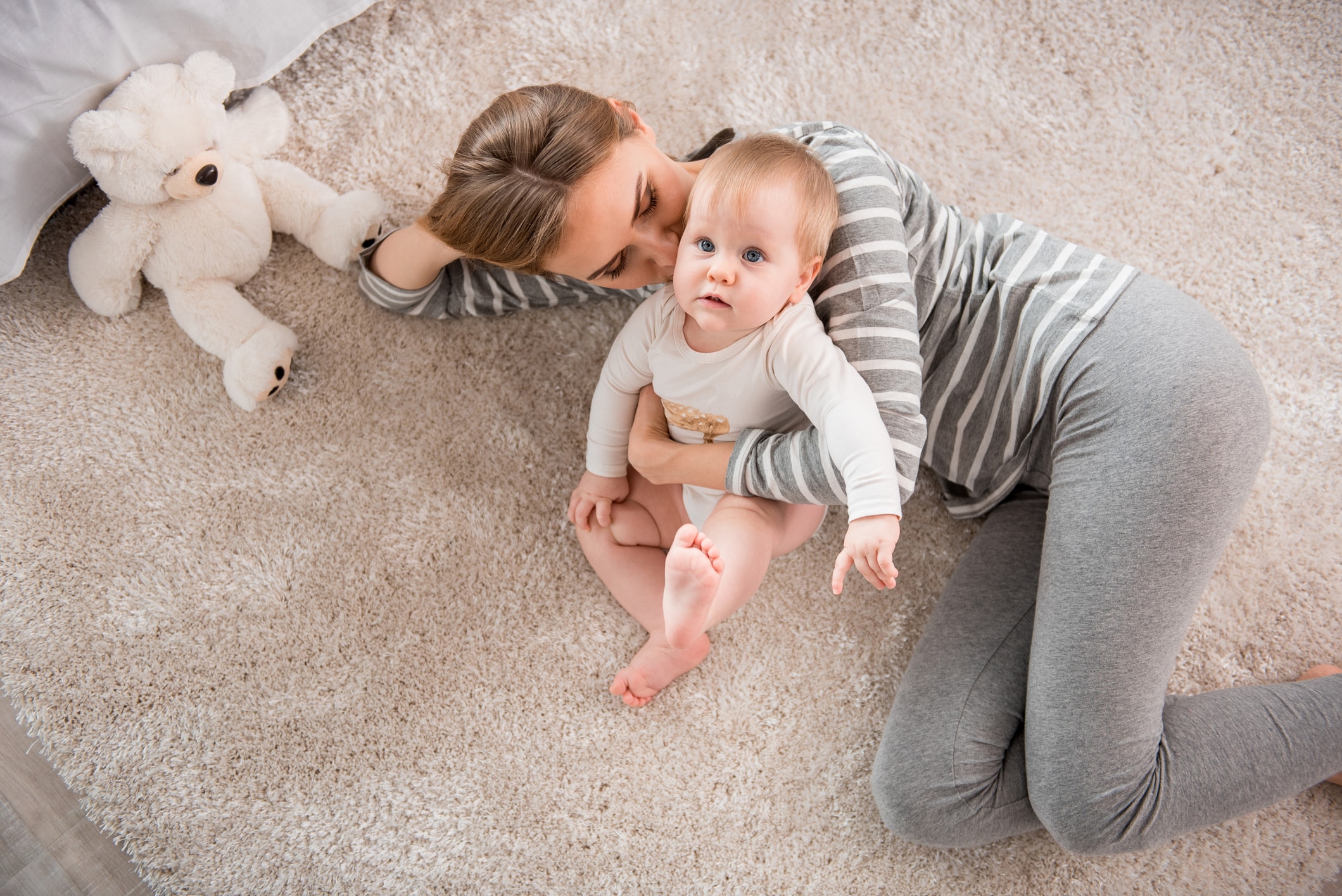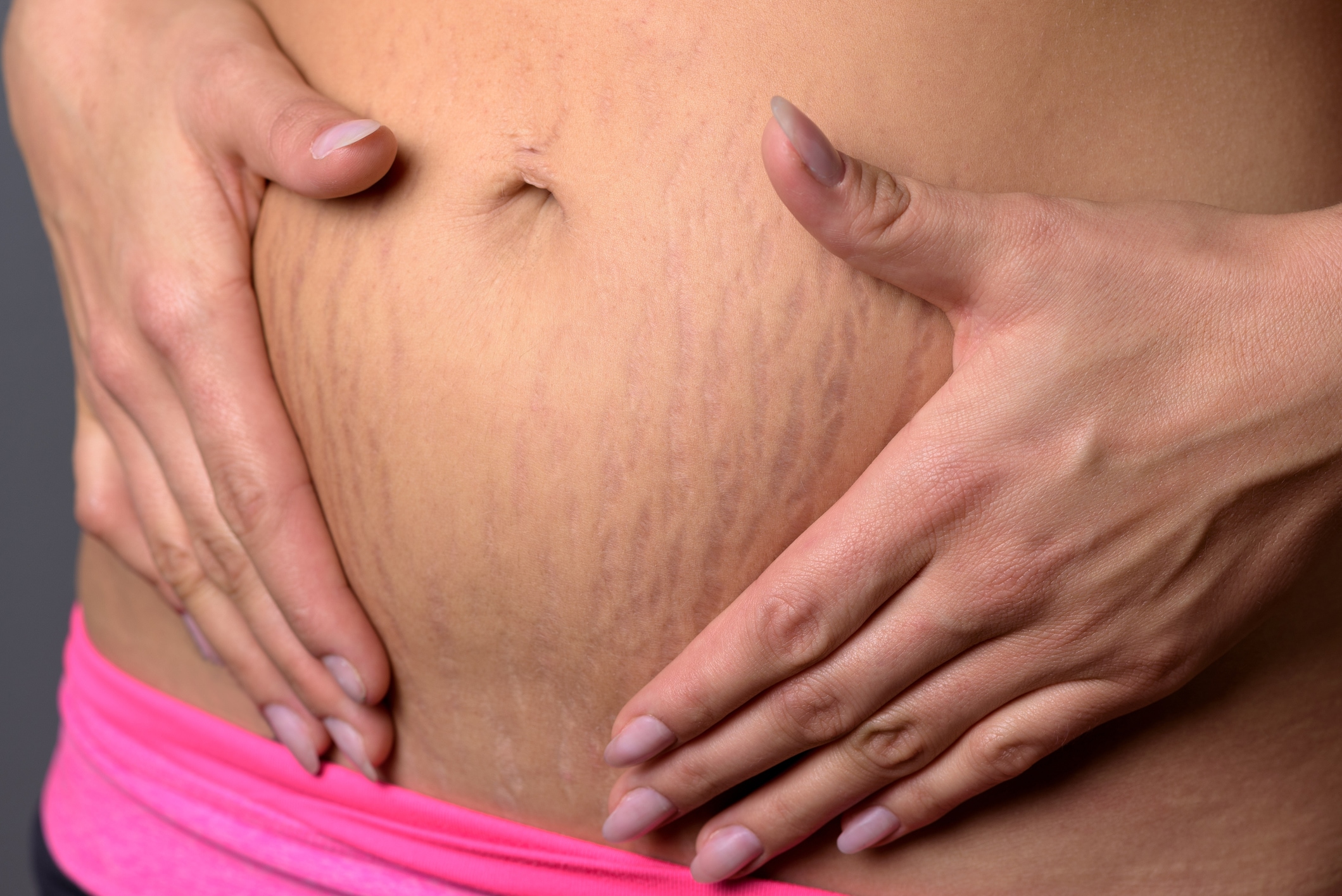In this article
No matter how ready you think you are to become a mother, the actual process of transitioning from child-free woman to “mom” can be upending in unexpected ways. From needing to make child care arrangements before even thinking about leaving the house alone to suddenly needing to buy a whole new wardrobe for a changed body, the process of becoming a mother can knock women off-kilter, mentally and physically. So it’s no surprise that there’s actually a word for this process: matrescence.
Like adolescence, matrescence is a natural process to go through. But the joy of parenthood alongside the physical changes and the overwhelm, the guilt, the anxiety, the worry and all of the things that transpire in the process of becoming a mom are bound to shake up your life, says Paige Bellenbaum, a licensed clinical social worker and founding director and chief external relations officer at The Motherhood Center.
Still, there is power in knowledge, and navigating these changes can be a little easier when they are identified. Here, experts and parents share their wisdom and tips on navigating matrescence.
Key takeaways
- Matrescence, a term coined in 1975 by anthropologist Dana Raphael, is the process of transitioning into motherhood.
- Like adolescence, matrescence is a natural process to go through. But the physical changes and the joy, overwhelm, guilt, anxiety and worry that come with it are bound to shake up your life.
- Managing expectations, embracing small moments of joy, finding support, being mindful of the information you’re engaging with, practicing self-care and setting boundaries can all help you to navigate the challenges of matrescence.
What is matrescence?
Coined by anthropologist Dana Raphael in her 1975 book “Being Female: Reproduction, Power, and Change,” the word “matrescence” refers to “the time of mother-becoming.”
While the term has been around for some time, “matrescence” has experienced a resurgence with the release of Lucy Jones’ book “Matrescence: On the Metamorphosis of Pregnancy, Childbirth and Motherhood,” an examination of the experience of becoming a mother, including research across numerous fields of study, such as neuroscience and sociology.
The experience of becoming a mother can look and feel different for everyone, but it’s also important to acknowledge the realities of these changes openly, adds Bellenbaum. “When we don’t prepare mothers for the trials and tribulations of matrescence, we are doing them such a disservice,” she explains. “We are setting them up for failure because when these challenges do come their way, they feel isolated. They feel alone. They feel like they’re the only ones that are going through this. And that leads to secrecy, contributing to the perinatal or postpartum mood and anxiety disorders (PMAD) cases that go undiagnosed and untreated.”
“When we don’t prepare mothers for the trials and tribulations of matrescence, we are doing them such a disservice. We are setting them up for failure because when these challenges do come their way, they feel isolated.”
— Paige Bellenbaum, a licensed clinical social worker and founding director at The Motherhood Center
What happens during matrescence?
A variety of transformations occur as a result of matrescence, and the effects are different for everyone who goes through it. No matter what a person has heard from friends who are parents or what they’ve read, it is still an individual experience that each woman must go through themselves.
Within 24 hours of delivering their child, the mom-to-be assumes a whole new level of responsibility — potentially alongside a partner — and starts down a path of rediscovering who they are in this new reality. Having a baby can make you feel like the rug has been pulled out from underneath you, says Bellenbaum.
Being aware of what you might expect on the horizon after welcoming your child can make the transition from child-free to parent a bit less bumpy, so here’s how a woman may experience matrescence.
You experience stunning hormonal shifts
Pregnancy comes with a surge of estrogen and progesterone, followed by a sudden drop in the same hormones after giving birth, which can have a significant impact on mood.
Samantha Knauer, a registered nurse and parent of two in Portage, Wisconsin, was surprised by the effects of shifting hormones after giving birth. She recalls having trouble regulating her body temperature — to the point that she had to switch up her wardrobe — as well as her emotions for the first twelve weeks postpartum. Even as a medical professional, Knauer was thrown off by the intensity of the hormonal changes she was experiencing.
You might not recognize your body
Perhaps one of the most talked about results of becoming a mother are the physical changes — from gaining weight during pregnancy to facing immediate, societal pressure to “bounce back” after giving birth, to finding that your breasts change shape, size and purpose, says Bellenbaum. Not to mention that the hormone relaxin can cause your feet to go up a size and, after experiencing faster hair growth during pregnancy, you could lose handfuls of luscious locks as hormones dip.
Then, depending on what your delivery looked like, you might be grappling with lingering pain from vaginal tearing, recovering from a C-section or realizing that your pelvic floor would benefit from physical therapy.
If all that wasn’t enough, sleep deprivation and insomnia can take a toll as well, adds Jennifer Patton, a museum educator and parent of two in New York City. “Along with the typical sleep deprivation, I had trouble falling asleep as well, just because of the anxiety of anticipating when my daughter would wake up again,” she recalls.
Your emotions may put you through the wringer
Matrascence can also come with the so-called baby blues and perinatal mood and anxiety disorders (PMADs), says Bellenbaum. She added that statistics show that one in five new mothers experience a PMAD but that those numbers are likely closer to one in three because 75-80% of all cases go undiagnosed and untreated.
Priscilla Priebe, a business owner and parent of three in Saint Paul, Minnesota, was terrified of the emotional and hormonal aftermath of postpartum, even from a young age, having seen many people close to her suffer from it and receive little support. Postpartum depression was common in her family and, without a support system nearby, she was apprehensive of what would happen to her if she were “left to heal emotionally and physically on [her] own.”
And while postpartum wasn’t as scary as she anticipated, she did end up dealing with postpartum depression and struggled to get the mental health support she needed due to poor insurance coverage.
Knauer, on the other hand, found herself dealing with a diagnosis of postpartum anxiety after giving birth to her first child. “I struggled emotionally and physically,” she remembers. With no family nearby, she says, “I did not feel prepared or supported. It was everything people described: wonderful, exhausting, sad and happy. The depth of these feelings was surprising.”
And even in the absence of PMADs, as the rollercoaster of parenthood begins, matrescence tends to spark emotional upheaval. Patton described the early postpartum days as being full of emotional extremes, a reality no one had prepared her for. One minute, she’d feel overwhelming joy, and the next she’d be mourning her previous, child-free life, a common but taboo line of thought.
Your social life might take a hit
Welcoming a child can be difficult for some people as they strive to form their support system. For example, if work was a source of socialization, new parents might struggle with loneliness during parental leave.
Patton recalls being caught off-guard by the isolation she experienced soon after giving birth. “I realized I didn’t have any adults to see or talk with during the day,” she notes. The mom groups she tried felt cliquey, and she remembers it felt like “reliving teenage exclusion.”
You may have to re-discover who you are
When you have a baby, you may need to rethink how work, hobbies and self-care fit into your life while you adjust to this new normal. And that can lead to an identity crisis.
“One of the biggest things that goes along with the process of matrescence is identity and the sense of self,” says Bellenbaum. “And it’s something that we just don’t talk nearly enough about. Within a day or two of the birth, a woman goes from a place of having a sense of autonomy, a sense of control, a sense of flexibility to [being in] full-time 24-hour mom mode.” And this can be a very difficult pill for some women to swallow, Bellenbaum adds.
Priebe remembers that after she got pregnant the first time, it felt like her youth came crashing down on her. “I was so scared that everything I loved about being childless would disappear,” says Priebe. As a musician, she worried she’d have less time to perform with her band. She also thought their child-free friends would be annoyed by having a baby around.
But, not only did their friends and family love having the baby around, Priebe was able to find time to play music. She found that being a mom became a core part of her life, while still maintaining her own identity. “I started to learn that sharing my life with her was part of being a parent,” recalls Priebe.
“One of the biggest things that goes along with the process of matrescence is identity and the sense of self. … Within a day or two of the birth, a woman goes from a place of having a sense of autonomy, a sense of control, a sense of flexibility to [being in] full-time 24-hour mom mode.”
— Paige Bellenbaum
How long does matrescence last?
Because matrescence covers a multitude of changes, the results can be temporary, but they largely make for an indelible shift. In fact, a 2021 study in Brain Sciences found that “pregnancy-induced brain changes are detectable even at six years” postpartum, opening the door for “the possibility that the brain changes induced by pregnancy are lifelong and enduring.”
And while there is still research to be done, some parents have noticed that even years after going through matrescence, they still feel its effects. McBain says that as a parent to two teens, she feels “matrescence leaves a permanent mark.” In addition to describing her body as being stronger now, she sees herself as growing and changing alongside her children.
How can I navigate matrescence?
With so many intense changes, matrescence can seem intimidating and scary. And while it is filled with struggles, Bellenbaum reassures mothers-to-be that there are also “moments of bliss.” That aspect of balance is a great place to start, with the following tips from the experts and parents we spoke to.
Manage your own expectations
When you’re inundated with so many examples of what being a mother “should” look like, it can be easy to expect too much of yourself as a parent. For example, it can seem like the only right way to feed your child is with all-organic foods, processed appropriately for baby-led weaning. Or you might find yourself in a battle between co-sleeping and sleep training camps. And that pressure can be overwhelming, says Bellenbaum.
But if you know ahead of time that the early days of parenting might be rocky – you may feel anxious or overwhelmed, sad or exhausted — Bellenbaum says that may help you feel less alone, as these are all normal experiences of becoming a mother. “It doesn’t mean you’re a terrible mom or that you’re doing anything wrong, it means that these are elements and aspects of matrescence,” she says.
Embrace the small moments of joy
When you’re exhausted, it’s easy to get caught up in the hard parts of becoming a mom, but Bellenbaum encourages you to pay attention to the micro-moments. “[These moments could be] when you’re holding your baby, and you’ve been up since 4 a.m., but the sun rises, and you watch it through your window,” she explains. “[Or] the first time the baby smiles.”
She recommends holding on to those moments to reflect on when things are difficult and says that as you consciously collect these positive memories, they replace negative narratives.
Focus on finding support
Bellenbaum recommends asking yourself ahead of time how you’re going to care for yourself in this postpartum phase. Depending on your resources and support network, this might look like researching night nurses or postpartum doulas, meal prepping with friends in the weeks ahead of your due date or setting up a registry fund for house cleaning services.
Be mindful of the people — and social media — you’re engaging with
“Follow platforms that are normalizing the trials and tribulations of motherhood, that are talking about the hard parts,” advises Bellenbaum. For example, if the aspirational parenting content someone posts makes you feel more anxious than inspired, don’t hesitate to unfollow them.
Patton emphasizes the importance of “finding like-minded people/parents you truly connect with” to give yourself a well-rounded support system. You might find these people at your child’s daycare or even sitting next to you at library storytime. Or perhaps, it’s a friend who had kids before you and can offer you their seasoned expertise.
Practice self-care
While it may feel easier said than done, Knauer advises making time to do things that are just for you. “You can’t pour from an empty cup,” she says. “And our children deserve to see the best versions of ourselves.” She makes time for exercise and reading by telling her children how long she’ll be spending on each activity and explaining to them that these breaks allow her to be the best mom possible.
Create a mental health plan
Bellenbaum encourages moms-to-be and new moms to document their mental health details to prepare for potential shifts after welcoming a baby. For example, in her practice, she has patients consider how they’ll share with a partner or loved ones that they’re experiencing symptoms of PMADs.
She even has them draw up an action plan that includes details like ways they may express depression or anxiety or other mental health changes to their partner (withdrawing, intrusive thoughts or angry outbursts, for example) and what therapist or practice they can contact, if necessary.
Get help for anxiety/depression
Matrescence is challenging enough without dealing with PMADs. McBain advises starting therapy before giving birth. “I love when clients start therapy preconception or during pregnancy, because it gives us lots of time to work on this upcoming transition before women are in the depths of postpartum,“ she says.
However, it is never too late to reach out for help. “If you’re feeling hopeless, sad or if you’re feeling like things are not bringing you joy, If you feel like you’re constantly worrying, ruminating, catastrophizing about the health and well-being of your baby, if you feel like you’re not bonding, if you feel like a failure or you wish you’d never done this or you feel like a terrible mother, know that these feelings are incredibly common, and there is help,” says Bellenbaum. “And with support and treatment, you can feel better.”
A final word on matrescence
Because each woman’s experience of becoming a mother is unique, there’s no one universal piece of advice when it comes to matrescence. While that can be scary to hear, it can also be a relief to know that the “unknowing” is a universal maternal experience. “Despite the fact that women and birthing people have been giving birth since the dawn of time, nobody knows how to do this, especially not the first time,” says Bellenbaum.
In that uncertainty is the possibility for individual growth and discovery. No two parents are alike, and different parts of parenting will appeal to different individuals. Patton, for example, thought she’d be more stereotypically fun, as a parent. Instead, she enjoys project-based play and describes herself as the family manager, while her husband is the imagination play ringleader. As Patton concludes, “I’m not necessarily the parent I thought I would be, but I’m enjoying parenthood more than I ever thought was possible.”





